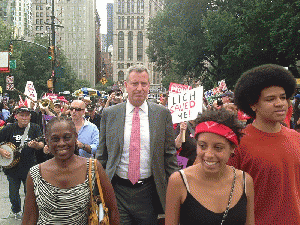Reprinted from huffingtonpost.com

Bill de Blasio and family
(Image by (From Wikimedia) Flickr user Bill de Blasio, Author: Flickr user Bill de Blasio) Details Source DMCA
Bill de Blasio and family by Wikipedia
A full-page of revelations in the New York Times that Bill De Blasio was an active organizer in the Central American solidarity movement and before that, an outspoken opponent of nuclear power in high school, should hugely excite the progressive base in New York politics after a long period of Republican rule. De Blasio did not leave his radical youth behind either; in the present day, he is a leading critic of stop-and-frisk and the massive economic inequalities dramatized by Occupy Wall Street.
Instead of turning moderate New Yorkers against him, the new revelations may actually help De Blasio's mayoral campaign, for example by winning votes in Latino precincts and awakening a Left which often derides electoral politics. (That is, if De Blasio does not suddenly renounce his past in an attempt to assuage the center. He shows little sign of doing so at the moment.)
A background in solidarity with the Sandinistas does not make for a conventional political resume. In fact there are few veterans of radical movements in mainstream politics. Unlike Europe and Latin America, the gap between social movements and electoral politics in the United States is vast and deep. The result is a deeply unhealthy tilt on the electoral spectrum towards the pragmatic center and conservative right, which influences policy outcomes and shrinks the spectrum on television and radio talk shows.
But a De Blasio victory in New York could well put progressive politics on the central stage of national media coverage and debate. It will solidify the growing support for those on the national level like Elizabeth Warren and Bernie Sanders. It will lend credibility and spirit to networks like Progressive Democrats of America. It could give The Nation much more mainstream impact in the political culture. It will be a win for the AFL-CIO in its search for progressive allies. Additionally, it might anchor progressives in the needs of the poor, not simply middle-class reform, in a contemporary echo of what took a younger Bill De Blasio to Nicaragua during the Reagan Eighties: to care for the medical needs of the marginalized and empower them in their communities.
On a personal note, I must admit being late in noticing this campaign. It was an Irish thing. My good friends in Belfast hoped that if Christine Quinn was elected she would strengthen the position of Irish immigrants in New York, and invest pension funds in Belfast. I liked the idea of all those Irish Catholics voting for an Irish lesbian. I never acted on the idea, unlike Gloria Steinem and others who carried their Quinn banners over the edge of doom. But my interest in Quinn delayed my focusing on De Blasio whom I shallowly assumed was one of those issue-oriented policy advocates who usually lose. Then I became convinced by his multi-racial family. Imagine a white Italian mayoral candidate campaigning with his teen-age African American son at subway stops in the era of Trayvon Martin's death and New York's stop-and-frisk case! The Nicaragua revelations only made his candidacy more interesting.
It's too bad that the anarchists and many of the Occupiers who are so dogmatically against electoral politics won't vote, at least not whole-heartedly, for a candidate who carries forward the spark they lit.
Just think about it; Bloomberg, Giuliani, Ray Kelly, Bratton, all teetering towards banishment and the most progressive national mayor towards La Guardia, taking power as a voice for the stricken cities. Taking its own time, a new New Left is rising.




